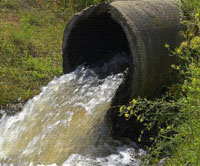Water Pollution May Lead to Cancer
U.S. federal study uncovered horrible statistics of water pollution in the country. According to it nearly half of lakes and reservoirs nationwide contain fish with potentially harmful levels of the toxic metal mercury.

The Environmental Protection Agency found mercury — a pollutant primarily released from coal-fired power plants — and polychlorinated biphenyls in all fish samples it collected from 500 lakes and reservoirs from 2000-2003. At 49 % of those lakes and reservoirs, mercury concentrations exceeded levels that the EPA says are safe for people eating average amounts of fish.
Mercury consumed by eating fish can damage the nervous system and cause learning disabilities in developing fetuses and young children.
Fewer lakes and reservoirs — 17 % — had fish containing polychlorinated biphenyls, or PCBs, above recommended levels. PCBs were widely used as coolants and lubricants until they were banned in the late 1970s, but because they last in the environment for long periods of time, they can still be found in fish. PCBs have been linked to cancer and other health effects.
In August, the U.S. Geological Survey released a study of fish contamination based on a a survey of 300 streams nationwide. That research found mercury in all fish sampled, but only about a quarter of the fish had mercury levels exceeding EPA levels.
The EPA said Tuesday its findings underscore the need to further reduce mercury pollution and make sure that fish consumption advisories are followed.
Earlier this year, the Obama administration said it would begin crafting new regulations to control mercury emissions from power plants after a federal appeals court threw out plans drafted by the Bush administration and favored by industry.
The EPA also has proposed a new regulation to clamp down on emissions of mercury from cement plants.
The Associated Press has contributed to the report.
Subscribe to Pravda.Ru Telegram channel, Facebook, RSS!





